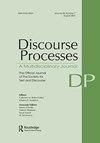Watch Out: Fake! How Warning Labels Affect Laypeople’s Evaluation of Simplified Scientific Misinformation
IF 2.1
2区 心理学
Q2 PSYCHOLOGY, EDUCATIONAL
引用次数: 2
Abstract
ABSTRACT Research has shown that laypeople tend to rely on their own evaluations when encountering scientific text information that is easy to comprehend. This easiness effect of science popularization leaves them vulnerable to uncritically accepting misinformation presented in a simplified manner. The present study investigated whether warnings of misinformation frequently used in social networks and other online services mitigate or even prevent the persuasive advantage of information easiness. Forty-one medical laypeople read brief argumentative online texts proposing fictitious health claims. Texts were either easy or difficult to comprehend, and they either were or were not labeled with a warning that independent fact-checkers dispute the information. Results showed that warnings effectively increased laypeople’s skepticism toward scientific misinformation. However, findings also suggested that warnings do not reduce the persuasive advantage of misinformation presented in an easily understandable manner, pointing to the limits of this communicative tool.小心:假的!警告标签如何影响普通人对简化科学错误信息的评价
摘要研究表明,普通人在遇到易于理解的科学文本信息时,往往会依赖自己的评价。这种简单的科普效果使他们容易不加批判地接受以简化的方式呈现的错误信息。本研究调查了社交网络和其他在线服务中频繁使用的错误信息警告是否减轻甚至阻止了信息易用性的说服优势。41名医学界人士阅读了简短的争论性网络文本,提出了虚构的健康声明。文本要么容易理解,要么难以理解,它们要么被贴上警告标签,独立的事实核查人员对信息提出质疑。结果表明,警告有效地增加了普通人对科学错误信息的怀疑。然而,研究结果也表明,警告并没有减少以易于理解的方式呈现的错误信息的说服优势,这表明了这种沟通工具的局限性。
本文章由计算机程序翻译,如有差异,请以英文原文为准。
求助全文
约1分钟内获得全文
求助全文
来源期刊

Discourse Processes
Multiple-
CiteScore
4.30
自引率
4.50%
发文量
27
期刊介绍:
Discourse Processes is a multidisciplinary journal providing a forum for cross-fertilization of ideas from diverse disciplines sharing a common interest in discourse--prose comprehension and recall, dialogue analysis, text grammar construction, computer simulation of natural language, cross-cultural comparisons of communicative competence, or related topics. The problems posed by multisentence contexts and the methods required to investigate them, although not always unique to discourse, are sufficiently distinct so as to require an organized mode of scientific interaction made possible through the journal.
 求助内容:
求助内容: 应助结果提醒方式:
应助结果提醒方式:


